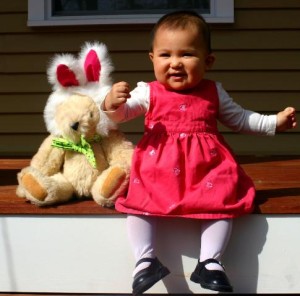 Since Easter was two days ago, it had me reflecting on when my kids were little and the expectation was that they would dress up and headed off to grandma’s house for church, an egg hunt, and ham dinner. It felt like a rite of spring every year. They didn’t question it when they were young – dressing up was looked forward to and fun. Then when they got older they would ask my permission to not dress up, “Mom, do we have to dress up?” to which I would reply, “Put on something nice, no jeans.”
Since Easter was two days ago, it had me reflecting on when my kids were little and the expectation was that they would dress up and headed off to grandma’s house for church, an egg hunt, and ham dinner. It felt like a rite of spring every year. They didn’t question it when they were young – dressing up was looked forward to and fun. Then when they got older they would ask my permission to not dress up, “Mom, do we have to dress up?” to which I would reply, “Put on something nice, no jeans.”
So what is holiday dressing up all about anyway? Why bother? There are lots of reasons why young children should be encouraged to dress up for special occasions, as deemed special by their parents. One reason is the expectation of respect that dressing up gives for the company involved (i.e. grandparents, church) and for the holiday itself (i.e. a wedding, Thanksgiving, etc.). It’s not only about showing respect, but dressing up truly makes the occasion special.
Another reason to dress up is a self-esteem boost that kids get when they are complimented on how nice they look. We all love compliments, kids too, which helps them feel better about themselves. When we tell little children that the expectation is that they will dress up, they take pride in their appearance and learn a lesson on how to feel good about themselves and their appearance. We teach them that appearance is important and how to reap the benefits that society gives to attractiveness (everyone who dresses up is more attractive).
When kids are older and asserting their independence they want to push the boundaries and see if they can get away with making a stand for themselves about their appearance. Their view of what ‘looks good’ and what their parents think looks good may be poles apart. But at this point, the lesson has been hopefully learned, so there is no harm in letting them feel their independent on this. As long as they know that jeans and a t-shirt are too relaxed to show their respect (in my world, but your family may have different standards regarding clean jeans) and they understand why we dress up. It shouldn’t be a battle of wills, or about winning and losing, or trying to get your way. This issue is not important enough to take a hard stand on. No one is getting physically hurt; they are simply growing up and exercising their power of choice.
COMMUNICATION TAKEAWAY: What is important is for children to know that no one can make you feel bad about yourself – only you can do that. If your older child says that, “no one but dorks dress up the way you want me to” recognize that at this stage peer pressure is very important, and they desperately want to fit in. It’s hard work to grow up, struggling to establish an identity but also conform to social norms. So cutting them some slack is greatly (but silently) appreciated.
